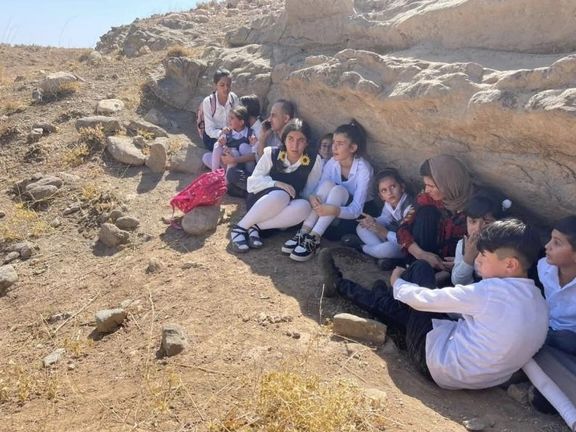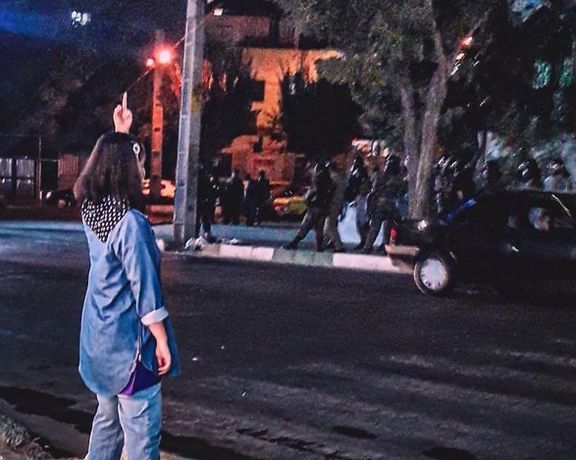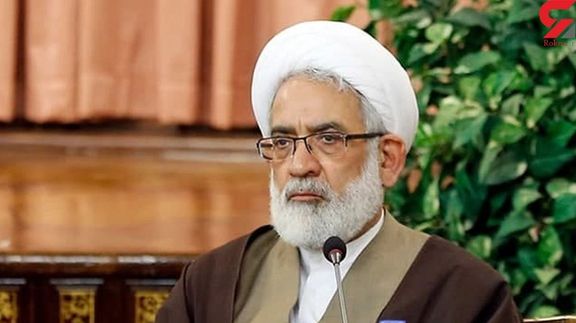UN Experts Call On Iran To Annul Death Sentence Of LGBTQ Activists

A group of United Nations experts have called on Iran to immediately halt the executions of two women sentenced to death over their support for LGBTQ rights.

A group of United Nations experts have called on Iran to immediately halt the executions of two women sentenced to death over their support for LGBTQ rights.
In a statement on Wednesday, the rights' experts said, "We strongly condemn the sentencing of Ms. Sedighi-Hamedani and Ms. Choubdar to death and call on authorities to stay their executions and annul their sentences as soon as possible."
"Authorities must ensure the health and well-being of both women, and promptly release them from detention," they said, voicing their concerns that the women may have been arbitrarily detained, ill-treated, and prosecuted on the basis of sexual orientation or gender identity, "including criminalization of LGBT people whose human rights they were supporting".
Iranian judicial authorities prosecuted Zahra Sedighi-Hamedani (31), known as Sareh, and Elham Choubdar (24) in August and notified them earlier this month that they had been convicted and sentenced to death on charges of "corruption on earth through the promotion of homosexuality." The verdict was issued by the Revolutionary Court of the city of Orumiyeh (Urmia), in West Azarbaijan province.
Rights group Amnesty International appealed to Iran’s Chief Justice Gholamhossein Mohseni-Ejei on January 25, calling for release.

The copy of a judicial letter published by a hacking group shows that Iranian officials knew Mahsa Amini sustained injuries during her arrest by the hijab police.
Edalate Ali (Ali’s Justice), a well-known hactivist group published the copy of an official letter on social media dated September 14 and written by an assistant prosecutor, Ali Amraei, to his boss in Tehran’s Court District 38.
The letter says that according to an investigation, eyewitnesses in the area where Ms. Amini was arrested saw a young woman arguing with the hijab police and falling, hitting her head on the curb.
Apparently, the police were trying to force her into their vehicle.
The letter shows that Islamic Republic officials knew Amini had received head injuries during her arrest but have been insinuating that she had a brain problem previously and might have died from an illness, unrelated to her arrest.
Also, the government letter is not conclusive evidence that the victim fell and hit her head on the curb, since the eyewitnesses cited by the assistant prosecutor saw a “young woman”, and did not verify her identity.
An eyewitness who saw Amini at the police station after her arrest told Iran International on Monday that the victim told her a police officer had hit her on the head and she was complaining of pain, before passing out.
The official version in the letter could also be an attempt to absolve the police from the accusation of assault by portraying the incident as perhaps an accident whereby Mahsa Amini fell and injured her head.
Her death immediately led to protests in Iran that have turned into a widespread uprising against the Islamic Republic. Young people especially, frustrated by harsher implementation of compulsory hijab, lack of other social freedoms and a dismal economy, reacted to the incident with indignation and began large protests that quickly turned into anti-regime demonstrations. Protesters and nearly 100 cities and toens, as well as many Iranian on social media say they can no longer tolerate the clerical system of government.
Authorities with all its police and anti-riot forces have not been able to quell the unrest so far, unlike past instances of mass protests since 2017.
Earlier, Iran International had also published Amini’s hospital CT scans showing a broken skull and a large brain swelling. Hospital staff also verified that she was brought in already in a coma and had no chance of recovery. The judiciary letter also confirms that she was delivered to the hospital in a coma.
President Ebrahim Raisi and other top officials have promised an investigation into the tragic incident, but so far, they have not issued any progress reports, and no one has been identified from among the police as responsible for Mahsa Amini’s fatal injury. There have been no suspensions and no arrests of police officers.

Amid nationwide protests in Iran sparked by the death in custody of a Kurdish girl, Iran’s Revolutionary Guard attacked Iraqi Kurdistan for the fifth consecutive day, drawing worldwide criticism.
On Wednesday, the IRGC once again launched artillery and suicide drone attacks against the positions of Kurdish groups opposed to the Islamic Republic in the Iraqi Kurdistan including Komala and Democratic Party as well as the Parti Azadi Kurdistan, aka PAK (Kurdistan Freedom Party).
Iran International has learned that a school close to the headquarters of the Democratic Party was also targeted by the IRGC’s retaliatory attacks, which injured several students.
The United States was quick to condemn Iran's use of ballistic missiles and drone attacks against the Iraqi Kurdistan region and called it "an unjustified violation of Iraqi sovereignty and territorial integrity."
"Moreover, we further condemn comments from the government of Iran threatening additional attacks against Iraq," the US State Department said in a statement.
The IRGC has so far attacked Iraq’s Koysancak and Soran districts in Erbil, along with Kirkuk’s Altınkopru and Sulaymaniyah’s Zirgvez, claiming that its Ground Force has used pinpoint accuracy missiles and suicide drones to attack the positions in the Iraqi Kurdistan which “played the most important role in the recent riots in Iran.”
At least nine people were killed and dozens more injured in the IRGC’s missile and drone attacks against PAK positions.
The United Nations Assistance Mission for Iraq (UNAMI) urged the Islamic Republic to immediately stop its attacks.

Spain summoned the Iranian ambassador Wednesday to convey Madrid’s “absolute condemnation” of the Islamic Republic's violence against peaceful protestors.
Spain summoned the Iranian ambassador Wednesday to convey Madrid’s “absolute condemnation” of the Islamic Republic's violence against peaceful protestors.
According to a diplomatic source on Wednesday, “The foreign ministry has summoned the Iranian ambassador in Madrid to express its objection over the repression of the protests and the violation of women’s rights.”
Spain, in particular, expressed its "abhorrence of the violence against Iranian women and their rights,” read a foreign ministry statement.
The Spanish ministry also urged Iran to carry out "an independent investigation (into the bloodshed) and to establish responsibility in a transparent, objective and thorough manner" while "ending all arbitrary arrests" of journalists and other citizens exercising their civic freedoms.
On Monday, Germany called in the Islamic Republic’s envoy in Berlin over Tehran’s heavy-handed crackdown on the popular protests, triggered by the death of Mahsa Amini, the 22-year-old Kurdish girl who died due to several blows on her head in the hands of hijab police.
On Sunday, the EU foreign policy chief slammed Iran’s handling of protests as unjustifiable and unacceptable, hinting that the European Union may issue sanctions over the crackdown.
In a statement on behalf of the EU, Josep Borrell,called on the Islamic Republic “to immediately stop the violent crackdown on protests and ensure internet access, as well as the free flow of information.”
“The European Union will continue to consider all the options at its disposal ahead of the next Foreign Affairs Council, to address the killing of Mahsa Amini and the way Iranian security forces have responded to the ensuing demonstrations,” read the statement.

Human rights group Amnesty International has launched a petition to set up an independent UN probe into the Islamic Republic’s killings and crackdown of protesters.
Amnesty has called on the international community to take action now, urging everyone to sign the petition and call on states to set up an independent UN mechanism now to investigate and ensure accountability for the most serious crimes under international law in Iran.
International reactions are coming everyday over the nationwide protests sparked by the death of 22-year-old woman, Mahsa (Zhina) Amini, who was mortally wounded in the custody of hijab enforcement police. An eyewitness told Iran International that Mahsa had told her in a detention room that an officer had hit her on the head.
On Wednesday, the UN Secretary General’s spokesman said, "We are increasingly concerned about reports of rising fatalities, including women and children, related to the protests across Iran,” calling for “prompt, impartial and effective investigation" into Amini’s death.
The Australian foreign ministry said in a statement, “The Australian government condemns the deadly and disproportionate use of force against protesters in Iran, following the tragic death of Mahsa Amini.”
“We have raised concerns into circumstances surrounding her death in custody with the Iranian Embassy in Canberra,” it added, saying, “We’re alarmed by reports that dozens of people have been killed and many more injured, including teenagers, during heavy-handed measures Iranian authorities have implemented to crackdown on the protests. We call on Iran to exercise restraint.”

Iran’s Judiciary has issued a directive to courts to act “decisively” and issue harsh sentences to many of those arrested during the ongoing anti-regime protests.
The general Prosecutor’s office headed by a notorious hard-liner cleric; Mohammad Jafar Montazeri issued the directive while thousands have been arrested since September 16 when the first protests began in Iran. At least 3,000 are in detention according to some estimates, but the true number may never be disclosed.
In the previous round of antigovernment protests in November 2019, around 10,000 people were arrested and many faced summary trials without due process of law, without their own lawyers and behind closed doors.
Montazeri’s directive to courts in of itself is an oxymoron, since he is the prosecutor, not chief justice or minister of justice. Iran’s legal system is based on a convoluted and improvised interpretation of Islamic Sharia, where there is no clear distinction between the prosecution and courts. The latter are controlled by the Judiciary, an extensive bureaucracy which also arrests people and directs prosecutors.
The Judiciary in turn is under the direct control of Supreme Leader Ali Khamenei who has ruled the country for the past 33 years. Judges and prosecutors are all appointed by the chief of Judiciary, an official handpicked by Khamenei.
Montazaeri in his directive offers some leniency toward those whose participation in the protests cannot be evidenced by prosecutors and courts, and who have no prior record, including activism on social media. Even this token measure of leniency can be meaningless since prosecutors routinely claim to have evidence and judges rarely dispute them.
But when it comes to those that the regime considers protesters, Montazeri’s directive is harsh.
“Those who have killed or wounded security agents, or destroyed public and private property, those who have attacked military and police centers, those with a record of taking part in previous unrest, thugs and criminals who have encouraged rioters, and foreigners who have been involved in protests should be held in prison until the court convenes and maximum punishment should be requested for them if there is evidence about what they did.”
In one paragraph the directive clusters together a wide range of real crimes with expressions of political dissent and demands maximum punishment.
Clashes have taken place between protesters and security forces, who have so far killed dozens of people. Some police and anti-riot troops have been wounded or even killed and this can be easily considered a crime. But the judicial system will use these charges against any protester it wants, with no recourse to a fair trial or appeal.
The directive also allows prosecutors to hold any person indefinitely and past instances show that torture and pressure will be freely used to extract self-incriminating confessions.
The Islamic Republic rarely issues permit for rallies, except to its own supporters who do not need a permission anyway. Therefore, all antigovernment protests can be deemed illegal, and protesters can be confronted by security forces and plainclothes Basij militia armed with clubs, knives and guns.
Often, protesters have no other choice but to defend themselves against the police and Basij members who come to disperse and stop rallies.
Montazeri’s directive is also aimed at intimidating a new generation of protesters who have not been cowed after more than ten days of daily confrontations with security forces.